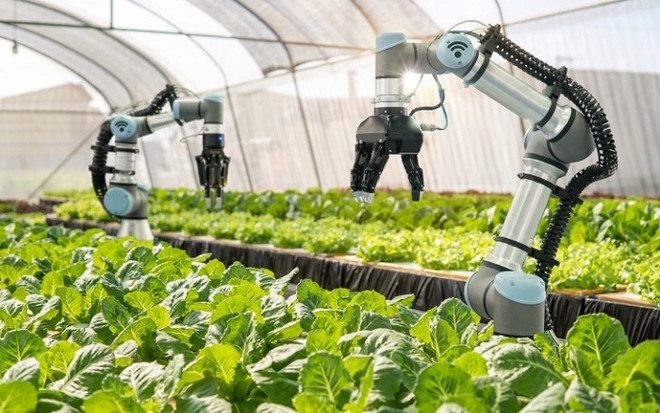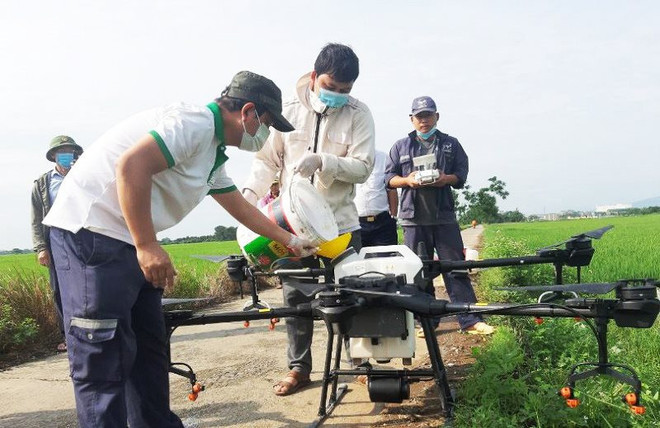 Technology application helps address labour shortages, improve produce quality, protect the environment, and boost sustainable development in agriculture. (Photo: nongnghiep.vn)
Technology application helps address labour shortages, improve produce quality, protect the environment, and boost sustainable development in agriculture. (Photo: nongnghiep.vn)Hanoi (VNA) – Hanoi’s agricultural sector has been working with localities across the capital city to apply technologies of the Fourth Industrial Revolution (Industry 4.0) to farming, helping address labour shortages, improve produce quality, protect the environment, and boost sustainable development.
Vu Thi Huyen, Director of the Nam Phuong Tien Cooperative of Organic Agriculture in Nam Phuong Tien commune of Chuong My district, said her cooperative is cultivating organic rice, pomelo, and vegetables on 70ha of land.
To improve quality, it has use Industry 4.0 technologies to manage and monitor 20ha of farmland, she noted, elaborating that cameras have been installed on fields while all information about the dates of cultivation and fertilising is recorded in e-diary app Egap.
Vice Chairman of the Thach That district People’s Committee Nguyen Kim Loan said that with support from the municipal Department of Agriculture and Rural Development and the NICOTEX Hanoi JSC, in the 2023 spring crop, local farmers accessed three-in-one drones that can sow seeds, fertilise, and spray plant protection substances.
He noted by using drones, farmers can cut the volume of plant protection substances by 20 -30% compared to manual spraying, reduce labour, and save time. Besides, they no longer have to be in direct contact with those substances, thus minimising their exposure to pesticides. Crops have also grown well and yielded higher output.
 Farmers prepare to use a drone to spray plant protection substances on a field in Di Nau commune of Thach That district, Hanoi. (Photo: hanoimoi.com.vn)
Farmers prepare to use a drone to spray plant protection substances on a field in Di Nau commune of Thach That district, Hanoi. (Photo: hanoimoi.com.vn)Vu Thi Huong, Director of the Hanoi Agricultural Extension Centre, said the city is home to a large farmland area with around 150,000ha cultivated of rice each year. Meanwhile, human resources for agriculture are decreasing as a large number of people have shifted to work in other sectors, leading to a rise in the area of uncultivated land.
Given this, local authorities have coordinated with localities to assist farmers to apply Industry 4.0 technologies such as cultivating machine and drones spraying plant protection substances. The application has helped farmers and cooperatives manage their fields, meet origin tracing requirements, and create production unit codes, thereby opening up a new development direction for Hanoi’s agriculture, she went on.
Nguyen Van Manh, Director of the Phu Thang Agricultural Cooperative in Dai Thang commune of Phu Xuyen district, suggested that in the time ahead, authorities should open more training courses to equip farmers with necessary knowledge and skills for capitalising on Industry 4.0 achievements. They should also provide concessional loans for cooperatives to apply technologies to all steps of farm produce production and supply chains.
Hanoi targets that products of hi-tech agriculture will account for some 70% of all local farm produce by 2025. It will also boost the access to and mastery of some suitable high technologies in seed production, farming, processing, and production management.
Deputy Director of the municipal Department of Agriculture and Rural Development Nguyen Manh Phuong said the department will proposed the Hanoi administration design programmes helping farmers mechanise farm work and apply Industry 4.0 technologies to agriculture so as to turn out products with high productivity, quality, and competitiveness.
On the other hand, localities in the city need to increase communications and guidance to encourage farmers to engage in hi-tech agriculture, develop agriculture in line with zoning plans, and form large-scale farming zones to facilitate technology application, the official added./.





























